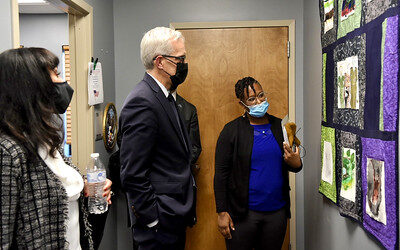While most U.S. veterans maintained or improved physical and mental function a year into the COVID-19 pandemic, almost 20% showed a decline, according to a new study.
Gout Largely Treatable, but a Considerable Burden in Older Veterans
One of the earliest recorded and most intensely painful diseases, gout was historically called the “disease of kings.” For centuries, it was thought to affect only the wealthy and aristocratic.
VA Clinicians Tackle Issue of Defining and Combatting ‘Diabetes Distress’
The term “diabetes distress” is used to describe the emotional response to living with diabetes, a life-threatening illness that requires chronic and demanding self-management.
Targeted Therapies for CLL Widely Used at VA; Prolonged Survival
U.S. military veterans with chronic lymphocytic leukemia (CLL) routinely received therapies in line with current evidence-based treatment practices over the past two decades, and those who were treated with targeted therapies had longer overall survival, according to a national VA study with more than 20 years of clinical data.
New Guidelines Address Use of Topical Ruxolitinib in Atopic Dermatitis
Using topical ruxolitinib cream to treat atopic dermatitis decreases the need for other AD treatments, according to new research.
Atopic Dermatitis, Other Skin Issues Are Challenging for U.S. Military
Military servicemembers are often exposed to drastic climates, environments, and living conditions which may make them more susceptible to cutaneous diseases, according to a new study.
NIH Study Leads to First FDA Approval for Rare Immunodeficiency Syndrome
A phase III study led by a researcher at the National Institutes of Health (NIH) has resulted in the first approval of a drug for activated phosphoinositide 3-kinase delta (PI3Kδ) syndrome (APDS), a rare congenital immunodeficiency syndrome.
Bladder, Kidney Cancer Rates Lower in Younger Servicemembers vs. Civilians
Younger military servicemembers have lower rates of bladder and kidney cancer than a similar civilian cohort, but that appears to change with age.
Many Veterans With Diabetic Kidney Disease Might Remain Undiagnosed
The authors of a new study suggested their findings might warrant a revision of diabetic kidney disease (DKD) patient identification and management in U.S. veterans.
Higher MIBC Rate but No More Mortality in Black Veterans vs. Whites
Black patients presented with the highest rates of de novo muscle-invasive bladder cancer (MIBC) at the VA, a new study has found.
Critical OIG Report Raises Key Questions About VA’s Community Care Program
A recent VA Office of the Inspector General (OIG) audit has added more fuel to the argument around community care, finding that VA has provided little accountability over the third-party providers tasked with overseeing the department’s community care networks.
Military Veterans With Sex Chromosome Aneuploidies Tend to Be Underdiagnosed
Men with sex chromosome aneuploidies, meaning they have an additional X or Y chromosome, successfully serve in the U.S. military, but they have been greatly underdiagnosed and have higher medical morbidity with aging, according to a recent study.
Is Chlorthalidone Better for Veterans With Past Cardiovascular Events?
Prior myocardial infarction or stroke should be taken into account when deciding to prescribe chlorthalidone (CTD) vs hydrochlorothiazide (HCTZ) in older patients with hypertension.
Survey Suggests MTF Employees Remain Unhappy With DoD’s New Genesis EHR
A recent survey of employees at military treatment facilities shows significant dissatisfaction with DoD’s new electronic health record system (EHR), which completed its 7-year rollout in March.
Longer Deployment, Exposure to Burn Pits Linked to Respiratory, CV Disease
Servicemembers with prolonged deployment to military bases with open burn pits might have an increased risk for developing adverse health conditions, such as respiratory and cardiovascular disease, according to a recent study.
Iron Deficiency Independently Association With Heart Failure Development
What is the relationship of iron status with incident heart failure in community-dwelling older adults, without regard to their kidney function?
Propofol Is Impairment Risk Factor in Children With ALL
New research evaluated the effect of cumulative exposure to anesthesia on neurocognitive outcomes among a multicenter cohort of children with acute lymphocytic leukemia (ALL).
Almost 1 in 11 U.S. Military Casualties Received Warm Fresh Whole Blood
To help save lives, especially in battlefield situations, the U.S. military has frequently used a so-called walking blood bank to obtain warm, fresh whole blood (WFWB).
VA Has Low Rates of Preoperative Life-Sustaining Treatment Documentation
Surgery is a significant healthcare event that necessitates timely planning for goals of care (GOC), involving discussions about one’s current values, aspirations and treatment preferences.
Study Emphasizes Importance of β-cell Function Loss in T2D Progression
For the estimated 1 in 10 Americans—or 1 in 4 veterans—with Type 2 diabetes, keeping blood glucose levels in the near-normal range reduces the risk of complications such as heart, kidney and eye disease.
Diabetic CKD Progression Faster in Veterans Than General Population
Veterans with diabetic kidney disease have a faster rate of stage progression compared to patients in the general population, and more than half of veteran diabetic kidney disease patients progressed to an advanced stage or died within 5 years, according to a recent study.
Reducing the Number of PPI Prescriptions: Benefits and Potential Pitfalls
One of the most commonly prescribed classes of drugs, proton pump inhibitors (PPIs), reduces the risk of gastrointestinal bleeding in certain patients at increased risk. Most PPI prescriptions are written for other reasons, however. In fact, an estimated 25-70% of PPI users might not have an appropriate indication.
OIG Report Puts Spotlight on Questionable Bonuses to Top VA Executives
In September 2023, VA revealed that it had erroneously awarded $10.8 million in bonuses to 182 senior executives at its central office using retention provisions included in the PACT Act.
Risk of Dying from COVID-19 Remains Much Greater Than With Influenza
The risk of dying while hospitalized for COVID-19 might have decreased since the pandemic began, but SARS-CoV-2 still has a considerably higher mortality rates than seasonal influenza, according to a new VA study.
VHA Nursing Home Residents Have More Fractures With Antihypertensive Use
Starting an antihypertensive treatment is associated with a significant increase in fracture risk in older long-term VHA nursing home residents, according to a recent study.
Legislators Told AI Both Promising, Scary for Improving VA Healthcare
The speed at which artificial intelligence (AI) is being embraced at the VA has legislators both hopeful and concerned, optimistic that it can improve veterans’ health but worried about data privacy and the possibility of software superseding human decision-making in clinical settings.
Shields Helped Implement Program to Bring Infusion Closer to VHA Patients
The idea for VA’s Close To Me Infusion Service has its roots in many places. One of them was a veteran that Jenna Shields, PharmD, BCOP, saw weekly at the Pittsburgh VAMC. Suffering from a hematologic condition, he required weekly infusions that could only be given at the medical center.
Change Takes Courage
I am tapping out this editorial on my 60th birthday in May. I prefer the annual and unavoidable nonevent—which is the date of my birth—to go by quietly and without too much hoopla. Family and friends have been asking if I feel any different at 60. I have responded that it seems no different from how I felt yesterday at 59. That is not to suggest I have not noticed the changes to my appearance associated with aging as I gaze in the mirror. I have no idea where all the gray hair is coming from (damned barber) or why less of it seems to be growing on my head but has sprouted with renewed aggressive vigor from my nose and ear canals (God does have a sense of humor).
Guideline Discordant Care Leads to Lower NSCLC Survival in AI/AN
American Indian/Alaska Native (AI/AN) patients have lower overall survival rates from non-small cell lung cancer (NSCLC), and at least part of the reason is that they are less likely to receive guideline-concordant care, according to a new study.
Lung Cancer Survival Rates Continue Improvement Within VHA
VA’s increasing usage of cutting-edge diagnostic and therapeutic treatments for lung cancer, as well as its equal access model to address healthcare disparities, could be a model for other medical systems, according to a new study.



